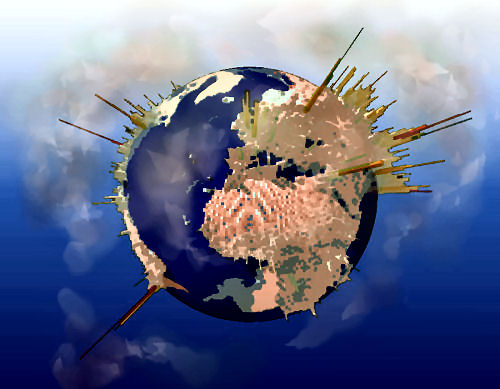The Silent Crisis that is global human population numbers
 Population analyst, Brian McGavin, writes about the silent crisis in our midst, of overpopulation. "Today there is a ‘Silent Crisis’ in our midst. The crisis, still largely unrecognised, is potentially greater than all the other problems that transfix our policy makers. For many decades now there has been a willful blindness in recognising that relentless human population growth is one of the pre-eminent problems we face. Rather than providing solutions and leadership, "More and more developed countries offering new ‘baby bonuses’ make it even less likely that we will achieve the lower figures being quoted in the media."
Population analyst, Brian McGavin, writes about the silent crisis in our midst, of overpopulation. "Today there is a ‘Silent Crisis’ in our midst. The crisis, still largely unrecognised, is potentially greater than all the other problems that transfix our policy makers. For many decades now there has been a willful blindness in recognising that relentless human population growth is one of the pre-eminent problems we face. Rather than providing solutions and leadership, "More and more developed countries offering new ‘baby bonuses’ make it even less likely that we will achieve the lower figures being quoted in the media."

The Silent Crisis
Today there is a ‘Silent Crisis’ in our midst. The crisis, still largely unrecognised, is potentially greater than all the other problems that transfix our policy makers.
For many decades now there has been a willful blindness in recognising that relentless human population growth is one of the pre-eminent problems we face. A problem that is driving the astonishing growth of fossil fuel use and its depletion, climate warming, bio-diversity loss, the growing shortage of fresh water to meet human needs - and as a consequence of these changes - the prospect that agriculture will be unable to produce enough food to feed us.
Nothing to celebrate
In 1950 world population was barely over two billion. As we pass seven billion at the end of October, it is nothing to celebrate.
In most countries today existing populations are not living environmentally sustainably, yet even if the UN’s assumptions of birth-rate decline in developing countries happens, global population will rise to 9.3 billion by 2050. Less reported is that if current birth rates persist, the United Nations Population Division warned in March 2009 that our population will exceed 11 billion in just 40 years.
More and more developed countries offering new ‘baby bonuses’ make it even less likely that we will achieve the lower figures being quoted in the media.
We have to start thinking about a ‘genuinely sustainable’ rather than ‘endless growth’ economy – an economy that is already faltering around us. Politicians focus on reviving economic growth and stimulating spending, but in an era of rapidly depleting resources, the ‘business as usual’ economy will need to be radically rethought to keep our complex society functioning, with a transition to a dynamic, self-supporting economy that satisfies our needs.
Growth Lobby
The growth lobby is pushing two great myths: That our ageing populationwill be a disaster unless we have higher birth rates and, despite rising unemployment, there is a terrible shortage of labour that only high immigration can supply. Both claims have been repeatedly shown to be either false or grossly exaggerated. They have huge long-term costs on our infrastructure and environment. Young people get old too and have higher dependency costs. Politicians don’t emphasise this.
In Africa, the UN now admits that it won’t meet its Millennium Development Goals but fails to explain the underlying causes for pessimism. Many countries in Africa already have massive unemployment and not enough food. How will they provide all the schools, jobs, hospitals and food to sustain populations that are set to more than double and in some cases triple in size in the next 40 years?
Governments will be struggling with millions of unemployed and hungry people attracted to violence and extremism. Look at the problems already in our news in countries like Haiti, Pakistan, Somalia, Yemen and Afghanistan – all countries on constant food aid, with exploding populations and increasingly scarce resources – yet population growth is never mentioned!
In Australia, mainly arid and with a water crisis, the population is set to double every 33 years, fuelled mainly by high immigration. America, Canada and the UK’s already high environmental impact is also increasing due to demographic pressures.
Saving the planet and greenwash
Most environmental organisations tell us that ‘if only we each reduced our environmental demand, population growth would not be a problem’. But our economic system, predicated on growth, is driving us in the opposite direction. Even if all the efficiency and renewable alternatives could be implemented the savings would be quickly wasted if populations continue to grow.
You can try reducing consumption all you want, but when you keep adding 100 million and another 100 million, you simply drive every human to a lower and lower standard of living. You cannot escape that reality.
Most experts now agree we will pass ‘peak oil’ production in 2012 and production of all liquid fossil fuels will drop within 20 years to half what it is today. Yet, forecasts project energy demand will grow by 60 per cent between 2002 and 2030. (Sources: (US) Energy Information Administration and chief executive, BP oil).
A huge problem is most alternative energy sources are poor energy performers because they need a high-energy input to provide a given energy return. Wind and solar power are intermittent, while Hydrogen is only as clean as the fuel source used to produce it and provides only a quarter the energy as the same volume of gasoline. Ethanol, from corn or sugarcane, contains 33 per cent less energy than the same amount of oil and competes with food production. Already, 18 per cent of U.S. corn now goes to producing ethanol, but provides only one per cent of the liquid fuel used in the U.S.
Charles Hall, professor of Environmental Science at the State University of New York, warns that apart from bicycles, there are virtually no functioning forms of transportation that are not powered by oil. Most products are made with petroleum and most jobs would cease to exist without it. Renewables (other than hydropower or wood) currently provide less than one per cent of the energy used in the world, but the annual increase in the use of most fossil fuels is far greater than the total electricity production from wind turbines and photovoltaics.
Governments now plan to spend billions by substantially increasing nuclear generation. Apart from potentially critical contamination risks, even doubling the number of reactors across the world could see commercially extractable uranium ore run out in just 20 years.
According to some energy analysts, the energy commitment required in mining, waste storage and disposal will shortly make the nuclear industry a net user of energy, just when the energy famine begins to hit hard. Unless there is an unlikely breakthrough with fusion power and we drastically cut demand, we are on course to exhaust the energy we need in the lifetime of many people alive today.
Professor John Beddington, UK Chief Scientist, warned in March 2009 that: “Our food reserves are at a 50-year low, but by 2030 we need to be producing 50% more food, we will need 50% more energy, and 30% more fresh water. They are dramatic problems, and they are all intimately connected”
Water
The Stockholm International Water Institute calculated in 2008 that 1.4 billion people live in regions where existing water cannot meet the agricultural, industrial, municipal, and environmental needs of all and only 2.5 per cent of the world’s water is fresh. Today, one person in five across the world has no access to safe drinking water, and one in three lacks safe sanitation.
Around 19% of US energy demand goes into food production. Fossil fuels to meet this demand are declining and many regions are already reaching the limits of their water resources, according to the UN’s World Water Development Report in 2009.
And then there is the impact of climate change. The accelerating icecap melt will make at least a metre rise in sea level probable by 2100 - threatening the world's major cities and fertile crop-growing deltas. Freshwater glaciers that feed major rivers used for irrigation are shrinking.
If governments won’t talk population, then they are not serious about cutting emissions, managing the water supply, managing food supplies, and a secure quality of life for our people. We can secure a way to genuine sustainability and a fairer use of resources, but we have to recognise the problem and act quickly.
It is not a question of ‘either or’ and who needs to act. We are in this together. Rich nations are consuming too much and populations continue to rise. Legitimate aspirations to raise living standards in high population countries like China and India are consuming ever-more resources. In many developing countries with acute water and food shortages, populations are projected to double or triple in size within 40 years – driving social unrest and migration on a massive scale.
There are several key challenges we have to talk about and face. In particular, ensuring development aid from donor countries delivers fully accessible and properly funded reproductive health care for all, along with equal access to education for girls and women. In many countries there are still barriers to this. We also have to start incentivising welfare systems to encourage fewer births rather than more.
Moral values?
Some people believe they have a right to have as many children as they want, whether they can look after them or not and fail to understand or just ignore the consequences of human population growth. Many commentators wilfully promote an ever-larger population in the name of freedom of choice. There will be precious little choice left if we go on multiplying with no thought for the future.
Others claim their religion as an excuse for actions that impact on others: Have large families "in the name of God"; Over-consuming resources? "God will provide” - so we don't need to think about the ecological consequences; and when the day of reckoning and collapse arrives - "It is God's will" - a religious opt-out from moral responsibility.
We have superior intellect to understand the consequences of our actions and the ecological and social devastation that will run like a scourge of misery for billions if population keeps increasing. Do we plan for a secure and better life or do we carry on blindly toward a minefield of lethal limits?
Rights come with responsibilities. Governments ‘incentivise’ many aspects of our lives for a common good, but the more crowded we become the more governments will police our behaviour and restrict our activities. We still have a choice. The world badly needs a grown-up, rational discussion of the population issue - without blame, abuse and hysteria.
It would be a tragedy if population growth became a catastrophe - a catastrophe we were too polite to talk about. Our children will not thank us for being driven to an abyss.
Originally submitted as, "The Silent Crisis,"
by Brian McGavin, writer and analyst, dated September 2011.

Recent comments